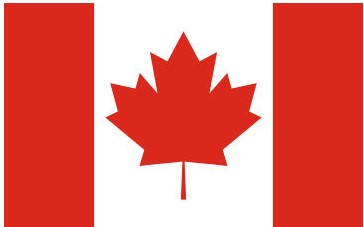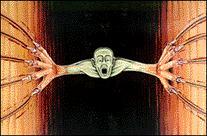Posted on October
30, 2023
Exhibit Eh
The Canadian govt becomes a serial
killer
by
Daniel
Clark
At a time when everyone is making a show of
sensitivity toward people with mental health problems, our neighbors to north
have come up with a typically compassionate liberal solution: kill them.
 In
one of the most repulsively cutesy acronyms ever devised, Canada named its 2016
assisted suicide law Medical Assistance In Dying (MAID), presenting itself as a
service to the people it kills. Under
this law, as originally passed, assisted suicide was allowed for subjects who
had "grievous and irremediable medical conditions," and for whom natural death
was "reasonably foreseeable." The second
of these requirements was repealed in a revision that was passed in 2021. According to the Canadian Department of
Justice, this dramatic expansion was proposed after receiving feedback from
"stakeholders," an explanation which begs the questions, how can a person be a
stakeholder in another person's death, and why in the world should such a
person be listened to?
In
one of the most repulsively cutesy acronyms ever devised, Canada named its 2016
assisted suicide law Medical Assistance In Dying (MAID), presenting itself as a
service to the people it kills. Under
this law, as originally passed, assisted suicide was allowed for subjects who
had "grievous and irremediable medical conditions," and for whom natural death
was "reasonably foreseeable." The second
of these requirements was repealed in a revision that was passed in 2021. According to the Canadian Department of
Justice, this dramatic expansion was proposed after receiving feedback from
"stakeholders," an explanation which begs the questions, how can a person be a
stakeholder in another person's death, and why in the world should such a
person be listened to?
This revised law called for an "expert review" within
three years, to determine whether mental illness should be allowed as a
justification for physician-assisted suicide.
The review was completed as required this past March, and the outcome
should surprise nobody. Canadians who
are perfectly physically healthy but depressed have become eligible to be
snuffed out by an agent of the state.
Parliamentary conservatives tried to reverse this guidance
legislatively, but on October 18th, their bill was defeated.
It may be easy to dismiss the usual slippery slope
arguments, but this is more like a slippery elevator shaft. Seven years ago, the initiative was
supposedly motivated by a desire to end the suffering of people who were
already dying, and today it is no longer necessary to have a terminal illness,
while "grievous and irremediable" has been made subjective to the point of being
meaningless. Anecdotal evidence, related
in an article of Spectator magazine, suggests that Canadians are now
being euthanized because of depression that has been brought on by
poverty. Almost inevitably, social
concerns, and not just medical ones, are being used to justify the ending of
human lives.
 Those
elastic standards are reflected in the increasing frequency with which the
program is being utilized. In 2022, one
in every 25 Canadian deaths was MAID-assisted.
That's a long way from a misguided attempt to ease suffering in a
handful of extreme cases. In a society
that is overmedicated and overdiagnosed, who could not be considered depressed
during certain periods of his life? Who
among us does not "suffer" in one way or another?
Those
elastic standards are reflected in the increasing frequency with which the
program is being utilized. In 2022, one
in every 25 Canadian deaths was MAID-assisted.
That's a long way from a misguided attempt to ease suffering in a
handful of extreme cases. In a society
that is overmedicated and overdiagnosed, who could not be considered depressed
during certain periods of his life? Who
among us does not "suffer" in one way or another?
For centuries, when somebody attempted suicide, Western
civilization operated under the presumption that the person really wanted to
live, and was only crying out for help.
Progressive states like Belgium, the Netherlands, New Zealand, Vermont,
Colorado, Oregon, and of course Canada have taken a more enlightened
approach. Wanna be dead? They'll help you be dead. They're not bound by any outdated
Judeo-Christian ethics. Besides, people
who need help are burdensome.
This may seem to be of little consequence to
libertarians, who tend to see the issue as a matter of personal freedom. It isn't really that, however, because MAID
is not available to everybody. To
qualify, one must submit a written request, which must then be approved by two
medical practitioners. There is no
"right to die"; there is only permission from the state. If a Canadian's life is deemed by government
stakeholders not to be worth living, then (wink, wink) that person qualifies
for "assistance."
Euthanasia may often be sold using the lexicon of
libertarianism, but in reality it is the ultimate subordination of the
individual to the collective. It was no
less an authority than Hemlock Society founder Derek Humphry who coined the
phrase "duty to die" in reference to assisted suicide, which he proposed as
"one method of cost containment." No
wonder the voting on MAID has broken down so distinctly along party lines, with
Liberal Party members voting pro-euthanasia and Conservatives voting against
it. To the Liberals, human beings are
little more than figures in a ledger, to be considered managerial problems for
the central authority. If you are
adversely affecting the bottom line, then you are expected to do your duty.
These days, people are celebrated for acknowledging
that they have "mental health issues," even if those are typical human problems
that people cope with all the time. The
phrase has been so deliberately misrepresented by this point that it has come
to mean everything and nothing. We're
not supposed to recognize that anything is wrong with someone who has such
profound mental health problems that he rejects his own identity, and
constructs a whole fantasy life based on his being someone he's objectively not. On the other hand, if a tennis player doesn't
feel like playing tennis today, that's a mental health issue, about
which we are obligated to wring our hands and ritually declare our awareness.
By the time the whole MAID concept creeps its way down
to Washington and infects our federal laws, what percentage of us will
officially be on record as having mental health issues, and how might this
affect the way we're treated when we seek medical care? Would we only be able to receive assistance
in dying by explicitly requesting it, or is it something that would be offered
to us, perhaps forcefully so, and to the exclusion of treatments that might
actually be helpful? "It says here on
your chart that you have a history of mental health issues, that you are
impoverished and uneducated, and that you do not belong to The Party. We have just the thing for that."
In Michael Moore's 1995 attempted comedy Canadian
Bacon, the Marxist filmmaker emphasized the points that Canada is a
socialistic country that provides universal healthcare, and that Canadians are
uniformly innocent and pleasant, suggesting by juxtaposition that the first
thing has got something to do with the second.
Whatever positive attributes the Canadian people may have, they surely
possessed them long before their country turned so sharply to the political
left. Moore made it appear that the
Canadians would have no problems in the world if not for the
misfortune of sharing a border with us cantankerous Americans. Contrary to his cartoonish portrayal,
Canadians are human beings, who face the same kinds of adversities in life as
anyone else. Many of them are even
depressed. Perhaps not for long, though.
The Shinbone: The Frontier of the Free Press